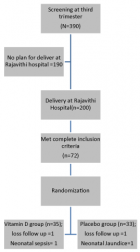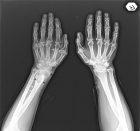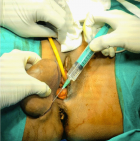Abstract
Research Article
Agro-morphological Growth Response of Acha (FONIO) (Digitaria exilis and Digitaria iburua [Kippist] Stapf.) Exposed to Colchicine: Germination, Plant Height and Leaf Number
Nyam DD*, Gonzuk NS, Sila MD, Tumba YC, Angyu EA and Kwon-Ndung EH
Published: 30 May, 2024 | Volume 8 - Issue 2 | Pages: 055-059
Acha (Fonio) Digitaria sp. is a valuable cereal crop widely cultivated in several African countries. The genetic improvement of Acha through induced mutagenesis has gained attention for enhancing desirable traits. Colchicine, a mitotic inhibitor, is commonly used to induce polyploidy, which can lead to alterations in plant characteristics. This study aimed to investigate the effects of colchicine treatment on germination, plant height, and leaf count of two Acha species. Seeds from two Digitaria species, Digitaria exilis, and Digitaria iburua, were subjected to colchicine treatment using different concentrations (0.05, 0.10, 0.15, and 0.20g/dL). The control group was treated with distilled water. Germination rates were assessed by measuring the percentage of seeds that successfully sprouted. Plant height and leaf number were measured at maturity and analyzed using ANOVA on SPSS Version 26. The results indicated that colchicine treatment significantly affected germination, plant height, and leaf number in both Digitaria species. Germination rates varied depending on the concentration, with lower germination observed at higher concentrations (70.70% and 74.3% for 0.20g/dL treatment in both species). In terms of plant height, colchicine-treated Acha plants exhibited significant differences compared to the control group. The majority of treated plants showed increased growth (57.00 cm to 60.70 cm in D. exilis and 114.10 to 122.40 cm in D. iburua) compared to the control. Variability in plant height was observed among the treated plants, suggesting that colchicine-induced polyploidy had varying effects on height across different genotypes. Similarly, the number of leaves was affected by colchicine treatment. Treated plants exhibited an increase in leaf number (56.70 to 60.7 for D exilis and 32.60 to 36.30 for D. iburua), compared to the control group (49.7 and 29.7 respectively). This variability suggests that colchicine-induced polyploidy may have influenced leaf development and growth patterns in Acha. Colchicine treatment had significant effects on germination, plant height, and leaf count in both varieties of Acha. The results suggest that colchicine-induced polyploidy can alter these plant characteristics. These findings provide insights into the potential use of colchicine treatment for inducing desirable traits in Acha through polyploidization, which may have implications for crop improvement and breeding programs. Further research is warranted to explore the underlying mechanisms and assess the impact of these alterations on overall agronomic performance and yield potential.
Read Full Article HTML DOI: 10.29328/journal.jpsp.1001133 Cite this Article Read Full Article PDF
Keywords:
Colchicine; Digitaria spp (Acha); Germination; Polyploidy; Variability; Yield
References
- Wang X, Li C, Cheng Z, Wang J, Sun Y, Li W, Yang J. Polyploid induction and molecular marker analysis in white clover (Trifolium repens L.). Front Plant Sci. 2018; 9:1313.
- Zhang H, Zheng X, Zhang Y, Li M. Comparative proteomic analysis reveals the positive effects of colchicine-induced polyploidy on drought stress tolerance in Arabidopsis thaliana. J Proteomics. 2019; 206:103432.
- Omondi AC, Chukwuka KS, Oyewale AO. Effect of colchicine on growth and yield of Digitaria exilis (acha) in south western Nigeria. J Agric Vet Sci. 2020; 8(8):63-67.
- Essel E, Asante I, Ebenezer Laing. Effect of Colchicine Treatment on Seed Germination, Plant Growth and Yield Traits of Cowpea (Viga Unguiculata (L.) Walp). Can J Pure Appl Sci. 2015; 9(3):3573-3576.
- Bond L. Colchicine Stimulation of Seed Germination in Petunia axillaris. J Hered. 1942; 33(5):200-201. https://doi.org/10.1093/oxfordjournals.jhered.a105167
- Smith RM. Colchicine-induced alterations in seed germination: Physiological and molecular aspects. J Plant Physiol. 2018; 205:68-79.
- Zhuo L, Fangwei Z, Diankun J, Yufang W, Shuguang W. Seed Germination and Seedling Growth of Dendrocalumus brandisii in vitro, and the Inhibitory Mechanism of Colchicine.
- Jones M, Safari M. Colchicine-induced polyploidization in some important agricultural crops. Int J Hortic Sci Technol. 2019; 6(1):35-46.
- Doku EV. Fonio (Digitaria exilis and Digitaria iburua) improvement in West Africa. Afr J Biotechnol. 2010; 9(50):8499-8505.
- Jones AB, Brown CD. Effects of colchicine on plant growth and development: A review. Plant Sci J. 2019; 25(3):123-136.
- Ravindra K, Jha KK, Sengupta S, Misra S, Mahto CS, Chakravarty MK, Saha DP, Narayan SC, Yadav M. Effect of colchicine treatment on plant growth and floral behaviour in cape gooseberry (Physalis peruviana L.). 2024. https://www.researchgate.net/publication/341151217_Effect_of_colchicine_treatment_on_plant_growth_and_floral_behaviour_in_cape_gooseberry_Physalis_peruviana_L
- Atichart P. Polyploid Induction by Colchicine Treatments and Plant Regeneration of Dendrobium chrysotoxum. Thai J Agric Sci. 2013; 46(1):59-63.
- Amiri S, Kazemitabaar SK, Ranjbar G, Azadbakht M. The Effect of Trifluralin and Colchicine Treatments on Morphological Characteristics of Jimson weed (Datura stramonium L.). Trakia J Sci. 2010; 8(4):47-61.
- Gu XF, Yang AF, Meng H, Zhang JR. In vitro induction of tetraploid plants from diploid Zizyphus jujuba Mill. cv. Zhanhua. Plant Cell Rep. 2005 Dec;24(11):671-6. doi: 10.1007/s00299-005-0017-1. Epub 2005 Aug 11. PMID: 16094528.
- He M, Gao W, Gao Y, Liu Y, Yang X, Jiao H. Polyploidy induced by colchicine in Dendranthema indicum var. aromaticum, a scented Chrysanthemum. Eur J Hortic Sci. 2016; 81(4):219-226.
- Kazi NA. Polyploidy in Solanaceous Crops. Asian J Multidiscip Stud. 2015; 3(4):69-73.
- Kushwaha KS, Verma RC, Patel S, Jain NK. Colchicine Induced Polyploidy in Chrysanthemum carinatum L. J Phylogenetics Evol Biol. 2018; 6(1):1-4.
- Manawadu IP, Dahanayake N, Senanayake SGJN. Colchicine induced tetraploids of radish (Raphanus sativus L.). Trop Agric Res Ext. 2016; 19(1):173-183.
- Manzoor A, Ahmad T, Bashir MA, Baig MMQ, Quresh AA, Shah MKN. Induction and identification of colchicine induced polyploidy in Gladiolus grandiflorus ‘White Prosperity’. Folia Hortic. 2018; 30(2):307-319.
- Roychowdhury R, Tah J. Chemical mutagenic action on seed germination and related agro-metrical traits in M. Dianthus generation. Curr Bot. 2011; 2:19-23.
- Mostafa GG, Alfrmawy AM, El-Mokadem HE. Induction of mutations in Celosia argentea using dimethyl sulphate and identification of genetic variation by ISSR markers. Afr J Biotechnol. 2014; 13:106-111.
- White LE. Morphological changes induced by colchicine in soybean (Glycine max L.). Crop Sci. 2020; 40(2):215-221.
- Devaux MN, Yisa J, Hamman B. Effect of colchicine treatment on seedling growth and early field establishment of three varieties of Digitaria exilis (Acha). J Agric Ecol Res Int. 2021; 23(4):1-9.
- El-Torky MG. Effect of EMS (Ethymethan sulphonate) on variegation type and some other horticultural traits in Euonymus japonicus, Linn. Alexandrian J Agric Res. 1992; 37:249-260.
- Zhang M, Liu C, Yin X, Huang L, Lin X. Effects of colchicine treatment on growth, yield and quality of potato (Solanum tuberosum L.) in subtropical regions of China. Acta Sci Pol Hort Cultus. 2013; 18(6):81-91.
Figures:
Similar Articles
-
Physiological impact of Zinc nanoparticle on germination of rice (Oryza sativa L) seedUpadhyaya H*,Roy H,Shome S,Tewari S,Bhattacharya MK,Panda SK. Physiological impact of Zinc nanoparticle on germination of rice (Oryza sativa L) seed . . 2017 doi: 10.29328/journal.jpsp.1001008; 1: 062-070
-
Detection of Clavibacter michiganensis subsp. michiganensis in tomato and chili seeds and farming area of Sinaloa, MexicoRuiz Alvarado Cristina*,Soto Ortiz Roberto,Cervantes Diaz Lourdes,Nuñez Ramirez Fidel,Celaya-Michel Hernán,Rueda Puente Edgar O. Detection of Clavibacter michiganensis subsp. michiganensis in tomato and chili seeds and farming area of Sinaloa, Mexico. . 2018 doi: 10.29328/journal.jpsp.1001019; 2: 044-054
-
Use of essential oils as new food preservatives (Case: Eucalyptus grandis and Eucalyptus crebra)Sendanyoye Marcel*. Use of essential oils as new food preservatives (Case: Eucalyptus grandis and Eucalyptus crebra). . 2018 doi: 10.29328/journal.jpsp.1001023; 2: 083-090
-
Avermectins: The promising solution to control plant parasitic nematodesMohamed S Khalil*,Dalia M Darwesh. Avermectins: The promising solution to control plant parasitic nematodes. . 2019 doi: 10.29328/journal.jpsp.1001036; 3: 081-085
-
Nematicidal effect of abamectin, boron, chitosan, hydrogen peroxide and Bacillus thuringiensis against citrus nematode on Valencia orangSherin FA Awd Allah*,Sandy E Hammad,MAM El-Saedy. Nematicidal effect of abamectin, boron, chitosan, hydrogen peroxide and Bacillus thuringiensis against citrus nematode on Valencia orang. . 2019 doi: 10.29328/journal.jpsp.1001041; 3: 111-117
-
Potential of Pleurotus sajor-caju compost for controlling Meloidogyne incognita and improve nutritional status of tomato plantsSherin FA Awd Allah*,Doaa M Mostafa,Eman FA Awad-Allah. Potential of Pleurotus sajor-caju compost for controlling Meloidogyne incognita and improve nutritional status of tomato plants. . 2019 doi: 10.29328/journal.jpsp.1001042; 3: 118-127
-
Natural infection of squash fruits (Cucurbita pepo) by Zucchini Yellow Mosaic potyvirus (ZYMV) in Alexandria governorateMahmoud Hamdy Abd El-Aziz*. Natural infection of squash fruits (Cucurbita pepo) by Zucchini Yellow Mosaic potyvirus (ZYMV) in Alexandria governorate. . 2020 doi: 10.29328/journal.jpsp.1001047; 4: 028-032
-
An experimental study on effects of fluoridated water on Abelmoschus esculentus var. Soh-198 (Lady Finger) Arshi Iram*Arshi Iram*. An experimental study on effects of fluoridated water on Abelmoschus esculentus var. Soh-198 (Lady Finger) Arshi Iram* . . 2021 doi: 10.29328/journal.jpsp.1001056; 5: 017-019
-
Silicon rates and beneficial microorganism on blast suppression and productivity of upland riceAlan Carlos Alves de Souza*,Eduardo Alves,Marta Cristina Corsi de Filippi,Adriano Stephan Nascente,Anne Sitarama Prabhu. Silicon rates and beneficial microorganism on blast suppression and productivity of upland rice. . 2021 doi: 10.29328/journal.jpsp.1001057; 5: 020-027
-
Ion transporters and their molecular regulation mechanism in plantsFaiçal Brini*,Walid Saibi. Ion transporters and their molecular regulation mechanism in plants. . 2021 doi: 10.29328/journal.jpsp.1001058; 5: 028-043
Recently Viewed
-
Pneumothorax as Complication of CT Guided Lung Biopsy: Frequency, Severity and Assessment of Risk FactorsGaurav Raj*,Neha Kumari,Neha Singh,Kaustubh Gupta,Anurag Gupta,Pradyuman Singh,Hemant Gupta. Pneumothorax as Complication of CT Guided Lung Biopsy: Frequency, Severity and Assessment of Risk Factors. J Radiol Oncol. 2025: doi: 10.29328/journal.jro.1001075; 9: 012-016
-
The Police Power of the National Health Surveillance Agency – ANVISADimas Augusto da Silva*,Rafaela Marinho da Silva. The Police Power of the National Health Surveillance Agency – ANVISA. Arch Cancer Sci Ther. 2024: doi: 10.29328/journal.acst.1001046; 8: 063-076
-
A Comparative Study of Serum Sodium and Potassium Levels across the Three Trimesters of PregnancyOtoikhila OC and Seriki SA*. A Comparative Study of Serum Sodium and Potassium Levels across the Three Trimesters of Pregnancy. Clin J Obstet Gynecol. 2023: doi: 10.29328/journal.cjog.1001137; 6: 108-116
-
Chaos to Cosmos: Quantum Whispers and the Cosmic GenesisOwais Farooq*,Romana Zahoor*. Chaos to Cosmos: Quantum Whispers and the Cosmic Genesis. Int J Phys Res Appl. 2025: doi: 10.29328/journal.ijpra.1001107; 8: 017-023
-
Phytochemical Compounds and the Antifungal Activity of Centaurium pulchellum Ethanol Extracts in IraqNoor Jawad Khadhum, Neepal Imtair Al-Garaawi*, Antethar Jabbar Al-Edani. Phytochemical Compounds and the Antifungal Activity of Centaurium pulchellum Ethanol Extracts in Iraq. J Plant Sci Phytopathol. 2024: doi: 10.29328/journal.jpsp.1001137; 8: 079-083
Most Viewed
-
Evaluation of Biostimulants Based on Recovered Protein Hydrolysates from Animal By-products as Plant Growth EnhancersH Pérez-Aguilar*, M Lacruz-Asaro, F Arán-Ais. Evaluation of Biostimulants Based on Recovered Protein Hydrolysates from Animal By-products as Plant Growth Enhancers. J Plant Sci Phytopathol. 2023 doi: 10.29328/journal.jpsp.1001104; 7: 042-047
-
Sinonasal Myxoma Extending into the Orbit in a 4-Year Old: A Case PresentationJulian A Purrinos*, Ramzi Younis. Sinonasal Myxoma Extending into the Orbit in a 4-Year Old: A Case Presentation. Arch Case Rep. 2024 doi: 10.29328/journal.acr.1001099; 8: 075-077
-
Feasibility study of magnetic sensing for detecting single-neuron action potentialsDenis Tonini,Kai Wu,Renata Saha,Jian-Ping Wang*. Feasibility study of magnetic sensing for detecting single-neuron action potentials. Ann Biomed Sci Eng. 2022 doi: 10.29328/journal.abse.1001018; 6: 019-029
-
Pediatric Dysgerminoma: Unveiling a Rare Ovarian TumorFaten Limaiem*, Khalil Saffar, Ahmed Halouani. Pediatric Dysgerminoma: Unveiling a Rare Ovarian Tumor. Arch Case Rep. 2024 doi: 10.29328/journal.acr.1001087; 8: 010-013
-
Physical activity can change the physiological and psychological circumstances during COVID-19 pandemic: A narrative reviewKhashayar Maroufi*. Physical activity can change the physiological and psychological circumstances during COVID-19 pandemic: A narrative review. J Sports Med Ther. 2021 doi: 10.29328/journal.jsmt.1001051; 6: 001-007

HSPI: We're glad you're here. Please click "create a new Query" if you are a new visitor to our website and need further information from us.
If you are already a member of our network and need to keep track of any developments regarding a question you have already submitted, click "take me to my Query."






















































































































































